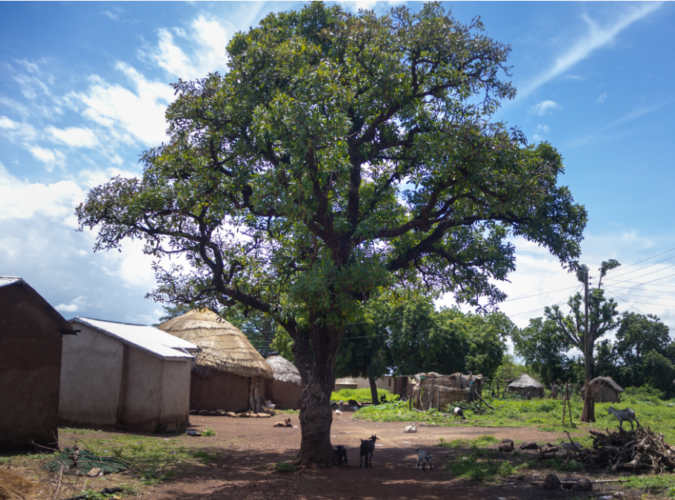When Eva Abiba walks out her front door, there’s a tree planted in front of her house. Eva’s house is not unique in Shelanyili, where she lives, but it is unique compared to many communities in Ghana.
Typically when afforestation projects are undertaken in Ghana, they involve large, dense plantations of trees next to farms or rural communities. But in Shelanyili, a small village in the Karaga District of the Northern Region, it’s the opposite. Every household has a tree planted either in front of or at the back of their compound. Everywhere you look in Shelanyili, there are neem, shea nut and acacia trees.
In the late 1990s, the community was given seedlings by the Department of Agriculture, which also taught community members how to grow and maintain them. The trees are now fully grown, casting a wide canopy in courtyards and gardens.
The community’s approach to the trees bordering it is also different from other jurisdictions. While other communities put their energy into reforestation, Shelanyili focused on conservation. It was one of the first communities in the district to ban bushfires caused by hunting, which had been whittling down tree cover and polluting the air.
The 1996 decision to ban bushfires was not without controversy. People from nearby communities protested, unable to pursue what had been a traditional way of hunting especially during the dry season. Confrontations with people from the neighbouring town of Karaga were common, sometimes escalating to violence. Over time the tension cooled, and the ban was successfully enforced with the help of the Fire Service Department.
Shelanyili’s simultaneous defence of its trees and aggressive planting among its houses have made it a model for communities throughout the district and region. Before, it suffered from flooding and rainstorms that ripped roofs off of homes, putting women, especially, in danger. They lost the privacy of their homes and were forced into a single room with their families.
The bushfires, meanwhile, not only destroyed Shelanyili’s protection from windstorms, but also damaged its soil. Farm yields decreased, while the burned underbrush, once a magnet for local animals, no longer attracted them.
All of that has changed. Roofs no longer blow off of houses, farm yields are increasing, and community members, especially women, are enjoying a boost in income by selling shea nuts. They also no longer have to travel long distances for firewood and water.
Eva, a 30-year-old resident of Shelanyili, cites the trees as a reason why Shelanyili has suffered less than other villages from the increasingly intense heat hitting the region. “We come out and sit under the trees, in the shade,” she says.
Shelanyili is one of the communities being featured in a documentary being jointly produced by Zaa FM and Jata FM, with help from Farm Radio. It will highlight how communities in Ghana are responding to climate change, and the challenges they face in implementing them. The hope is that other communities will learn from Shelanyili’s experiences.
Shelanyili’s decision to ban bushfires and its ingenuity in planting trees right next to homes and gathering spaces showcase how powerful these changes can be. Even with little external help, when a community shows resolve and plans for the long term, it can make a difference in the face of the climate crisis.
The On-Air for Gender-Inclusive Nature-based Solutions project is a 5-year project led by Farm Radio International in partnership with the Government of Canada that will use high-impact radio programs to work with local communities in Burkina Faso, Côte d’Ivoire, Ethiopia, Ghana, Uganda and Zambia to identify, share and support local Nature-based Solutions and amplify those solutions to a network of 3,500 broadcasters across 38 African countries so they can be duplicated across the continent.

